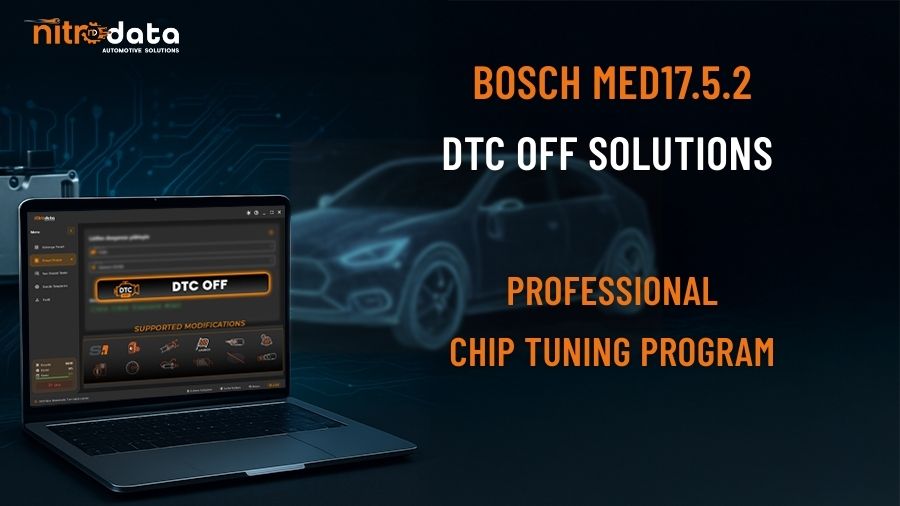MED17.5.2 DTC OFF Solutions | Automatic Error Code Deletion and Optimization with Nitro Data
What is DTC OFF? Why is it Done? DTC Deletion Procedures in MED17.5.2 ECU
MED17.5.2 ECU (Engine Control Unit), developed by Bosch, is an engine control unit designed for direct injection gasoline engines. It is particularly found in Volkswagen Group (VAG) vehicles with 1.2 and 1.4 TSI engines. It provides advanced ignition, injection and emission control. Managing error codes that arise after modifications to this ECU is critically important for performance and trouble-free driving.
What is DTC OFF?
DTC (Diagnostic Trouble Code) are error codes recorded in the vehicle's engine control unit. The DTC OFF procedure is an optimization solution that prevents the detection and recording of specific error codes in the ECU software.
Why is DTC OFF Done?
There are many important reasons for performing DTC OFF procedure in MED17.5.2 ECU:
Which Vehicles Use This ECU Model?
MED17.5.2 is frequently found in the following vehicle models:
🛠 Frequently Disabled DTC Codes in MED17.5.2
P0420 / P0430
Low catalyst efficiency - cancelled during CAT OFF procedures
P2002 / P242F
DPF clogging and efficiency codes - deleted after DPF OFF
P0401 / P0404
Insufficient EGR flow and valve failure - cancelled with EGR OFF
P0171 / P0174
Mixture too lean - disabled after Lambda OFF
P2084 / P208C
AdBlue system failures - completely blocked with AdBlue OFF
P0087 / P0088
Fuel pressure codes - optimized after Stage tuning
P0299
Insufficient turbo boost - adjusted during performance upgrades
P0234
Excessive turbo boost - limit raised after Stage 2
P0134 / P0135
No O2 sensor signal - deleted with lambda sensor cancellations
P0544 / P0545
Exhaust gas temperature sensor failure - cancelled during exhaust modifications
P2463
DPF ash accumulation - blocked when DPF systems are removed
P0400 / P0403
EGR flow error and valve control circuit - deleted during EGR system cancellation
How Does DTC OFF Work in Nitro Data?
Nitro Data has an advanced automatic DTC deletion infrastructure for MED17.5.2 ECU:
What Happens After DTC OFF Procedure?
Which Modifications Require DTC OFF?
DTC OFF must be applied for the following procedures in MED17.5.2 ECU:
Why Nitro Data?
Things to Consider Before DTC OFF Procedure
Choose Nitro Data for professional and safe DTC OFF solutions in MED17.5.2 ECU! With advanced algorithm infrastructure, automatic data protection, and comprehensive DTC code library, quickly and safely manage error codes after all modifications made to your vehicles. Enjoy a trouble-free driving experience by automatically cleaning DTC codes that arise after Stage tuning, DPF-EGR-AdBlue cancellations, and all your chip tuning procedures. Perform professional DTC OFF procedure in your MED17.5.2 ECU files within seconds with Nitro Data!







